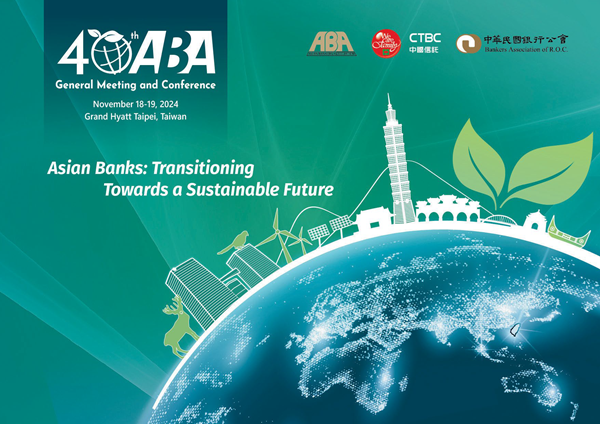40th ABA Conference in Taipei
"Asian Banking: Transitioning Towards a Sustainable Future"
November 18-19, 2024, Taipei Grand Hyatt, Taipei
Summary Report of the Proceedings
I. Introduction
Around 400 bankers from across the Asia-Pacific region and beyond gathered in Taipei on November 18-19, 2024, for the 40th General Meeting and Conference of the Asian Bankers Association (ABA). Led by Chairman Daniel Wu, Vice Chairman of CTBC Financial Holding Co. (Taiwan), the event brought together ABA members and industry leaders to discuss the future of banking in a rapidly evolving global environment.
The Conference, jointly organized by CTBC Bank and the Bankers Association of the Republic of China (BAROC) Taiwan, was held at the Grand Hyatt Taipei, the same venue as the 2015 ABA Conference. The theme for this year’s event “Asian Bankers: Transitioning Towards a Sustainable Future,” provided a valuable platform for networking, knowledge-sharing and exploring new opportunities in the banking sector. Over two days, participants were given the opportunity to engage with a diverse lineup of invited speakers who discussed key trends and developments shaping regional and global markets, as well as strategies for navigating challenges while seizing emerging opportunities.
The Conference featured in-depth discussions on four key topics of interest to the banking community: (a) Technology-Driven Transformation in Banking; (b) Partnering in Achieving Sustainability Goals; (c) Refocusing on Customers and Society; and (d) The Great Banking Transition.
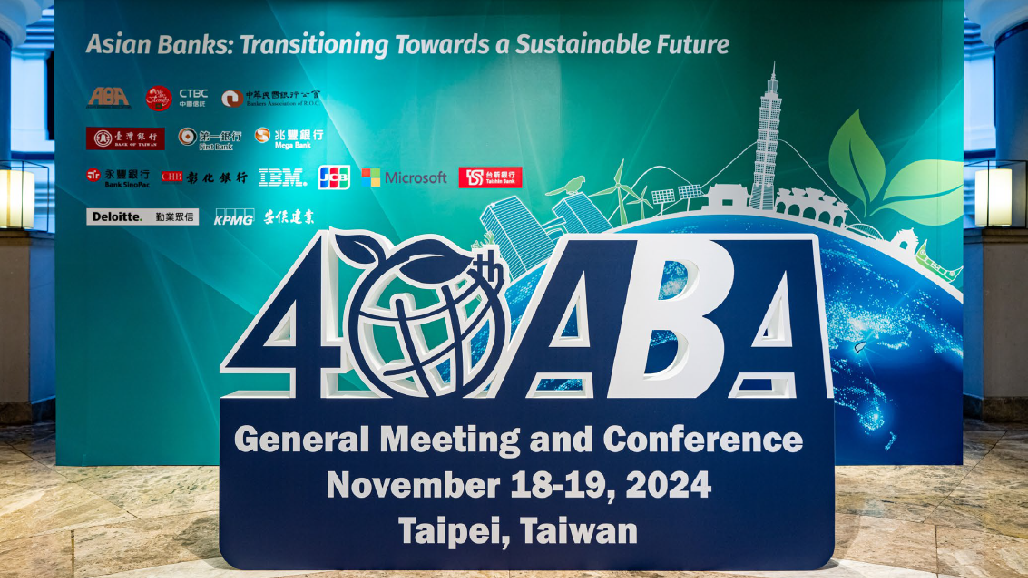
(1) Opening Ceremony
Opening Remarks by ABA Chairman
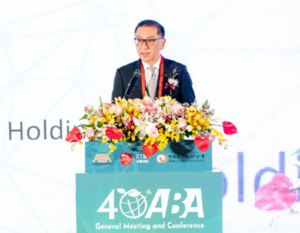 In his welcome remarks, ABA Chairman and Vice Chairman, CTBC Financial Holding, Mr. Daniel Wu noted that the Conference comes at a pivotal moment, as the banking sector grapples with profound and complex challenges in both the economic and financial landscapes. He highlighted that the industry is being reshaped by digital transformation, with a shift from traditional models to customer-centric and digitally-driven approaches. This transformation is being driven by factors such as evolving customer demands, new operating models, and a digitally-driven market.
In his welcome remarks, ABA Chairman and Vice Chairman, CTBC Financial Holding, Mr. Daniel Wu noted that the Conference comes at a pivotal moment, as the banking sector grapples with profound and complex challenges in both the economic and financial landscapes. He highlighted that the industry is being reshaped by digital transformation, with a shift from traditional models to customer-centric and digitally-driven approaches. This transformation is being driven by factors such as evolving customer demands, new operating models, and a digitally-driven market.
Regarding climate change, Chairman Wu emphasized that achieving sustainability goals requires collaboration among all stakeholders — governments, civil society, and the private sector, including banks and financial institutions. He stressed the need to mobilize resources such as technology development, financial capital, and capacity building to meet the region’s growing demand for sustainable finance.
Chairman Wu concluded by acknowledging that these trends and challenges present formidable obstacles not only for banks and financial institutions but also for businesses in general. However, he expressed confidence that ABA would play a key role in helping its members navigate these challenges.
He also underscored the importance of networking within ABA to foster greater interaction among bankers and banking sectors across Asia, which will be crucial for moving forward.
Keynote Address by Minister of Economic Affairs
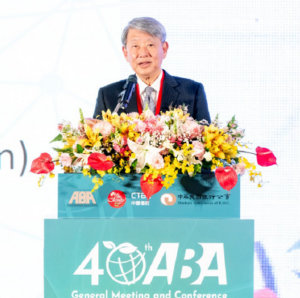 In his keynote address at the opening ceremony, the Republic of China’s (ROC) Minister of Economic Affairs Kuo Jyh-Huei underscored the critical importance of sustainability and digital transformation. As climate change intensifies, Minister Kuo stressed the need for businesses to balance commercial interests with environmental responsibility to achieve sustainable economic development.
In his keynote address at the opening ceremony, the Republic of China’s (ROC) Minister of Economic Affairs Kuo Jyh-Huei underscored the critical importance of sustainability and digital transformation. As climate change intensifies, Minister Kuo stressed the need for businesses to balance commercial interests with environmental responsibility to achieve sustainable economic development.
Minister Kuo also outlined Taiwan’s aim to leverage its prowess in semiconductor and information communications technology (ICT) to advance AI and drive industrial transformation. He highlighted “sustainability” and “digital transformation” as key pillars of Taiwan’s future development and corporate competitiveness. Citing President Lai Ching-te’s “National Project of Hope,” Minister Kuo reaffirmed the government’s commitment to achieving green growth and net-zero emissions by 2050. He added that the government is actively promoting the dual transformation of industries toward digitalization and sustainability, with green finance and technological innovation at the forefront.
To support this green transition, Minister Kuo shared that the Ministry of Economic Affairs (MOEA) is fostering collaboration between banks and SMEs through public-private partnerships (PPP). By leveraging energy service companies (ESCOs) and the financial sector, the MOEA aims to help businesses implement energy efficiency measures and carbon reduction strategies. The Ministry is also working to expand ESCO capacity and facilitate access to financing from banks and insurance companies, accelerating Taiwan’s progress toward its net-zero emissions goals.
Keynote Address by R.O.C. Financial Supervisory Commission (FSC) Chairperson
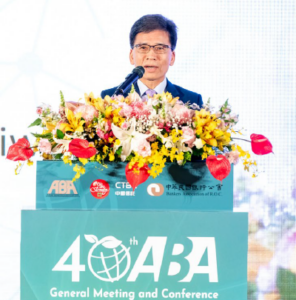 R.O.C. Financial Supervisory Commission (FSC) Chairperson Dr. Jin-Lung Peng. was also a Special Guest of Honor during the Opening Ceremony. In his address, Dr. Peng emphasized the dual challenges and opportunities of digital transformation and sustainable development for the financial industry.
R.O.C. Financial Supervisory Commission (FSC) Chairperson Dr. Jin-Lung Peng. was also a Special Guest of Honor during the Opening Ceremony. In his address, Dr. Peng emphasized the dual challenges and opportunities of digital transformation and sustainable development for the financial industry.
He underscored the importance of strengthening the digital competitiveness of Taiwan’s financial sector amid the wave of digital transformation. Dr. Peng outlined, five key strategies introduced by the FSC in July 2024 to support and promote the development of FinTech:
- Providing a broader range and flexibility for trials and experimentation with emerging technologies, allowing innovations to develop within manageable risks.
- Encouraging industry-wide collaboration to reduce internal development costs and strengthen collective innovation and efficiency.
- Continuing to explore FinTech opportunities, assisting traditional financial institutions in transitioning to enhance service efficiency and expand market reach.
- Supporting the development of online finance, including a comprehensive review of online financial services to better align with public needs and market demands.
- Considering the establishment of a Financial Markets Development and Innovation Division, focused on policy support and regulatory easing to create a more robust FinTech ecosystem.
In response to the challenges posed by climate change and to support the industry’s transition toward net zero, Dr. Peng said that the FSC introduced the “Green and Sustainable Finance Action Plan” on October 29, 2024. The plan aims to achieve concrete results in several key areas:
- Guiding funding to support corporate transition toward net zero, utilizing policies and financing tools to help businesses meet low-carbon targets.
- Building a data platform to improve information quality, enhance transparency and completeness in corporate carbon emissions data, encourage the financial sector to disclose carbon reduction targets and strategies, and actively participate in carbon reduction policies.
- Cultivating talent in sustainable finance by promoting certification and training programs, as well as refining rating mechanisms.
- Elevating Taiwan’s international influence in sustainable finance through participation in global forums and cooperation with key international organizations.
Welcome Remarks by Bankers Association of the Republic of China
 In his Welcome Remarks as Chairman of the Bankers Association of the Republic of China (BAROC) and co-organizer of the Conference, Dr. Ray Beam Dawn emphasized the relevance of the Conference theme in today’s banking landscape, where institutions are being called upon to balance economic growth with environmental and social responsibility. Dr. Dawn underscored Taiwan’s commitment to sustainable and inclusive finance, stressing the pivotal role of financial institutions in shaping an inclusive, resilient and sustainable future.
In his Welcome Remarks as Chairman of the Bankers Association of the Republic of China (BAROC) and co-organizer of the Conference, Dr. Ray Beam Dawn emphasized the relevance of the Conference theme in today’s banking landscape, where institutions are being called upon to balance economic growth with environmental and social responsibility. Dr. Dawn underscored Taiwan’s commitment to sustainable and inclusive finance, stressing the pivotal role of financial institutions in shaping an inclusive, resilient and sustainable future.
Dr. Dawn expressed his gratitude to both ABA and CTBC for making the event possible. He thanked ABA for its steadfast dedication to fostering collaboration and advancement within the Asian banking community, and CTBC for exemplifying the spirit of innovation and community focus as essential to the future of banking. He noted that the Taipei gathering offers a unique opportunity for attendees to exchange insights, discuss challenges, and forge new partnerships as they navigate the evolving banking landscape in Asia.
Keynote Fireside Chat
A key highlight of the Opening Ceremony was a fireside chat between Mr. Thomas Nides, Vice Chairman for Strategy and Client at Blackstone and ABA Chairman Mr. Daniel Wu. The discussion focused on their personal experiences and observations on the international financial landscape. Mr. Nides, who served as the U.S. Ambassador to Israel from 2021 to 2023 and held senior roles at Morgan Stanley for over a decade shared his views on the economic opportunities and challenges facing Asia in the post-pandemic era.
They discussed the role of Asian banks in shaping the global financial system, how institutions can position themselves to remain competitive and resilient in the post-Covid era, and how they must adapt to ongoing geopolitical shifts.
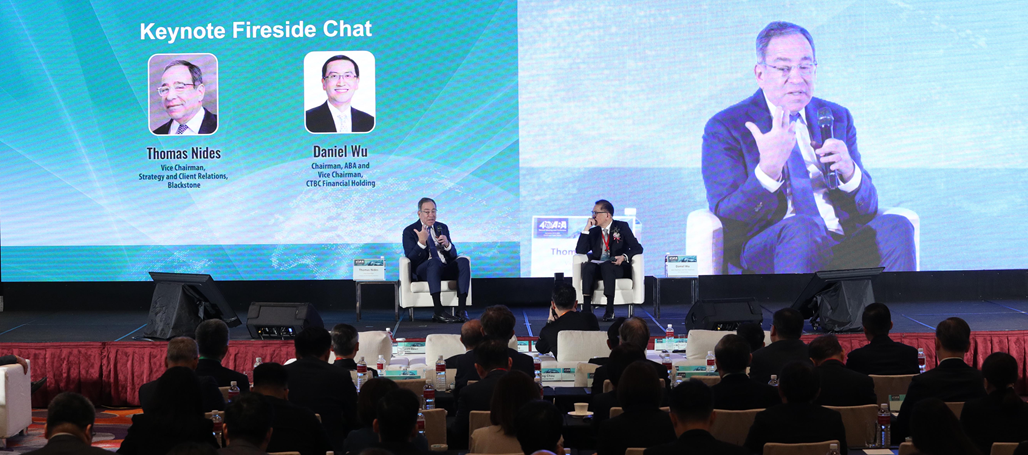
(2) Plenary Sessions
The Conference featured four Plenary Sessions, focusing on the following topics:
Plenary Session 1: Technology-Driven Transformation in Banking
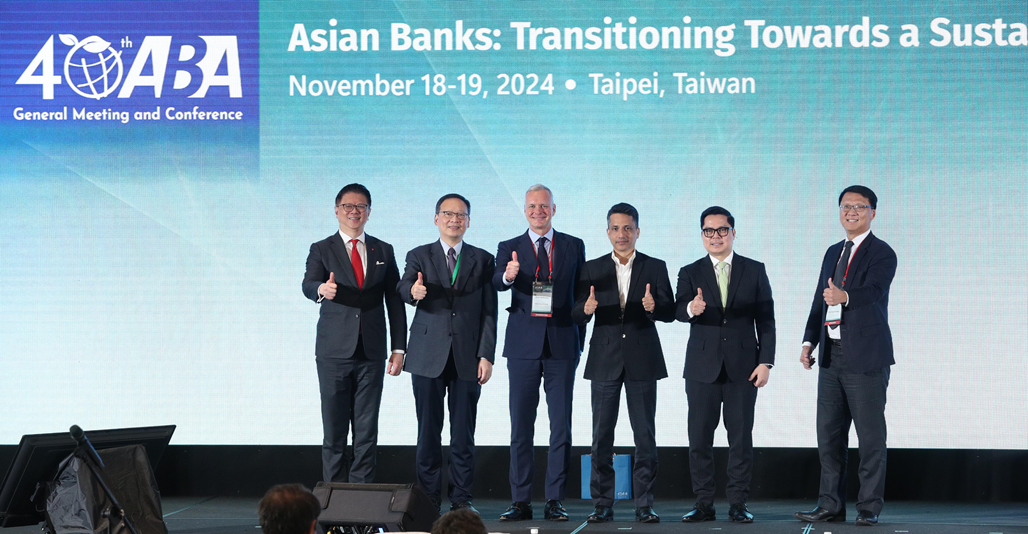
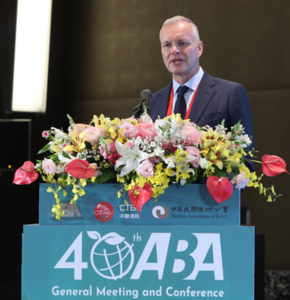 Speakers discussed how digital transformation is reshaping the banking industry, shifting from traditional models to customer-centric, digitally driven approaches. Key factors driving this change include evolving customer demands, operating models, modernized infrastructure, data analytics, a digitally driven market, and the widespread adoption of digital technologies. The panelists acknowledged the benefits of these shifts but also highlighted the complexity of the technology landscape, cost-effectiveness concerns, integration hurdles, and the critical need for security and regulatory compliance.
Speakers discussed how digital transformation is reshaping the banking industry, shifting from traditional models to customer-centric, digitally driven approaches. Key factors driving this change include evolving customer demands, operating models, modernized infrastructure, data analytics, a digitally driven market, and the widespread adoption of digital technologies. The panelists acknowledged the benefits of these shifts but also highlighted the complexity of the technology landscape, cost-effectiveness concerns, integration hurdles, and the critical need for security and regulatory compliance.
The session explored the latest banking technologies, identified the challenges faced by the industry, and examined how emerging technologies can help mitigate these challenges. Speakers and panelists shared insights on how IT leaders in banking can make informed decisions, navigate the complex technology landscape, and stay ahead of the curve.
Moderated by Mr. Oliver Hoffmann, Managing Director and Head of Asia at Erste Group Bank AG, Hong Kong Branch, the session featured the following speakers:
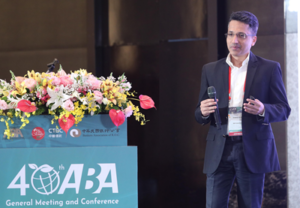 (1) Mr. Shahid Syed, Managing Partner, Asia-Pacific Financial Services Sector Leader at IBM Consulting, discussed “The Future of Banking.” His presentation covered strategic initiatives, customer experience, no-touch operations, core modernization, and the impact of generative AI in banking. Mr. Syed also shared an IBM “Client Zero” case study to illustrate these concepts in action.
(1) Mr. Shahid Syed, Managing Partner, Asia-Pacific Financial Services Sector Leader at IBM Consulting, discussed “The Future of Banking.” His presentation covered strategic initiatives, customer experience, no-touch operations, core modernization, and the impact of generative AI in banking. Mr. Syed also shared an IBM “Client Zero” case study to illustrate these concepts in action.
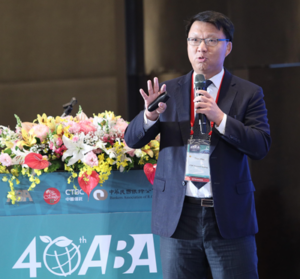 (2) Mr. Titan Chia, Head of Information Management at CTBC Financial Holding (Taiwan), spoke on “CTBC Technology and IT Transformation for Now and the Future.” Mr. Chia pointed out how the financial services sector has consistently enhanced innovation and customer experience through the adoption of emerging technologies. He highlighted CTBC Bank’s commitment to leveraging technology and IT transformation to navigate the evolving landscape of the financial markets, both now and in the future. He stressed that in the era of AI, companies that effectively harness AI will gain a competitive edge over those that do not. Mr. Chia shared how CTBC Bank is addressing the challenges and opportunities posed by AI in the financial industry, and how the bank is utilizing AI to reshape and elevate financial services as well as the digital next.
(2) Mr. Titan Chia, Head of Information Management at CTBC Financial Holding (Taiwan), spoke on “CTBC Technology and IT Transformation for Now and the Future.” Mr. Chia pointed out how the financial services sector has consistently enhanced innovation and customer experience through the adoption of emerging technologies. He highlighted CTBC Bank’s commitment to leveraging technology and IT transformation to navigate the evolving landscape of the financial markets, both now and in the future. He stressed that in the era of AI, companies that effectively harness AI will gain a competitive edge over those that do not. Mr. Chia shared how CTBC Bank is addressing the challenges and opportunities posed by AI in the financial industry, and how the bank is utilizing AI to reshape and elevate financial services as well as the digital next.
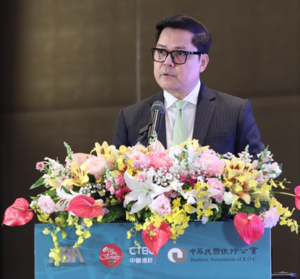 (3) Mr. Lito M. Villanueva, Executive Vice President and Chief Innovation and Inclusion Officer at Rizal Commercial Banking Corporation (RCBC) in the Philippines, presented on the topic of “Embracing Digital Disruption and Sustainable Finance.” He highlighted RCBC’s successful embrace of digital disruption, noting that the bank’s e-money transaction reached US$64.04 Billion in 2023, a 33% increase from the previous year. He outlined RCBC’s ‘super app’ which focuses on delivering customer-centric, high-tech and high-touch solutions. Mr. Villanueva also shared the bank’s guiding principles, known as the four Ps — passion, purpose, planet, and prosperity— driving RCBC’s commitment to sustainable financial inclusion.
(3) Mr. Lito M. Villanueva, Executive Vice President and Chief Innovation and Inclusion Officer at Rizal Commercial Banking Corporation (RCBC) in the Philippines, presented on the topic of “Embracing Digital Disruption and Sustainable Finance.” He highlighted RCBC’s successful embrace of digital disruption, noting that the bank’s e-money transaction reached US$64.04 Billion in 2023, a 33% increase from the previous year. He outlined RCBC’s ‘super app’ which focuses on delivering customer-centric, high-tech and high-touch solutions. Mr. Villanueva also shared the bank’s guiding principles, known as the four Ps — passion, purpose, planet, and prosperity— driving RCBC’s commitment to sustainable financial inclusion.
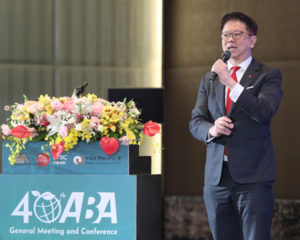 (4) Mr. Him Chuan Lim, Group Head of Strategy, Transformation, Analytics and Research (GSTAR) at DBS, shared the bank’s journey in digital and AI transformation. He provided an overview of DBS’s evolution, from its founding nearly 60 years ago to becoming the largest financial services group in Southeast Asia. Mr. Lim emphasized that DBS is now the largest listed company on the Singapore Exchange (SGX), with a market capitalization of around USD80 billion, and return on equity (ROE) of more than 18%, and a credit rating of AA-, making it the safest bank in Asia. He attributed much of DBS’s success to its digital and AI transformation, sharing how the bank is positioning itself for the future as the “Best Bank in the World.”
(4) Mr. Him Chuan Lim, Group Head of Strategy, Transformation, Analytics and Research (GSTAR) at DBS, shared the bank’s journey in digital and AI transformation. He provided an overview of DBS’s evolution, from its founding nearly 60 years ago to becoming the largest financial services group in Southeast Asia. Mr. Lim emphasized that DBS is now the largest listed company on the Singapore Exchange (SGX), with a market capitalization of around USD80 billion, and return on equity (ROE) of more than 18%, and a credit rating of AA-, making it the safest bank in Asia. He attributed much of DBS’s success to its digital and AI transformation, sharing how the bank is positioning itself for the future as the “Best Bank in the World.”
Plenary Session 2: Partnering in Achieving Sustainability Goals
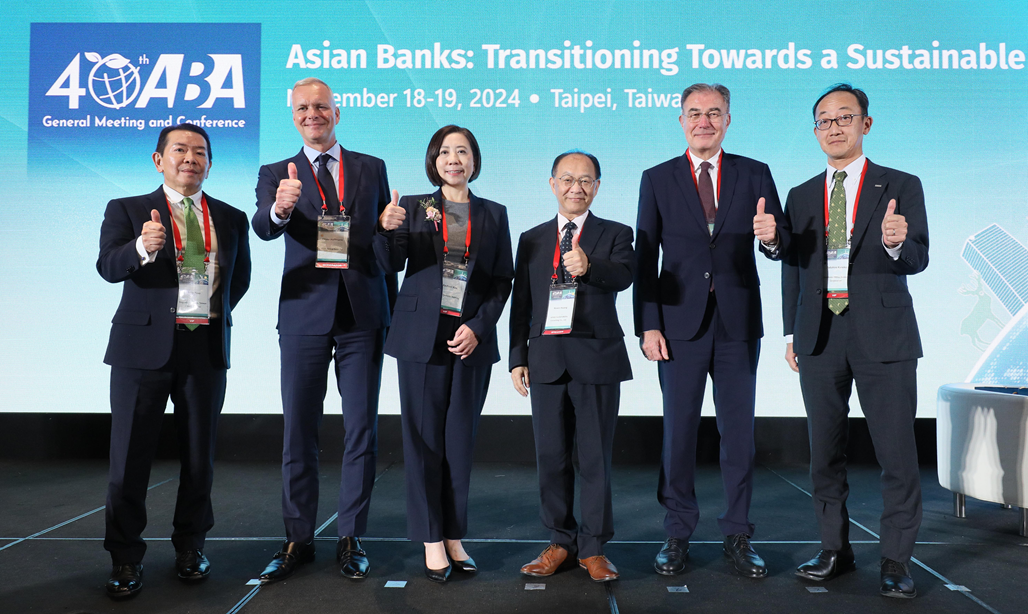
The speakers and panelists emphasized that achieving sustainability goals requires collective action from all stakeholders to ensure inclusive development. It needs partnerships between governments, civil society, and the private sector, including banks and financial institutions. They agreed that mobilizing both existing and additional resources, such as technology development, financial resources, and capacity building, is essential. The session highlighted the need to accelerate progress toward net-zero emissions and transform financing priorities, processes, and programs to support the region’s growing demand for sustainable finance.
Additionally, the session underscored the importance of multistakeholder partnerships – including among banks and financial institutions - to leverage the inter-linkages between the Sustainable Development Goals. Such partnerships can enhance the effectiveness and impact of sustainability efforts.
Speakers shared their experiences in addressing common challenges, identifying gaps and emerging issues, and recommending corrective action.
The session was moderated by Ms. Rachel Kao, President and Spokesperson of CTBC Financial Holding. The session speakers included the following:
 (1) Dr. Niven Huang, Managing Director of KPMG Sustainability Consulting, addressed the topic “Must Close the Gap for Financing Our Sustainable Future in Asia Pacific.” Mr. Huang emphasized the growing focus on ESG and SDGs since 2015 but noted that the sustainability challenges are becoming increasingly complex. He highlighted the financial gap that is hindering the achievement of these goals, stressing the need for financial institutions to integrate ESG and SDGs into their strategies. Dr. Huang also called for stronger governance within Asian financial institutions to combat greenwashing, which he predicts will become a mainstream issue by 2030.
(1) Dr. Niven Huang, Managing Director of KPMG Sustainability Consulting, addressed the topic “Must Close the Gap for Financing Our Sustainable Future in Asia Pacific.” Mr. Huang emphasized the growing focus on ESG and SDGs since 2015 but noted that the sustainability challenges are becoming increasingly complex. He highlighted the financial gap that is hindering the achievement of these goals, stressing the need for financial institutions to integrate ESG and SDGs into their strategies. Dr. Huang also called for stronger governance within Asian financial institutions to combat greenwashing, which he predicts will become a mainstream issue by 2030.
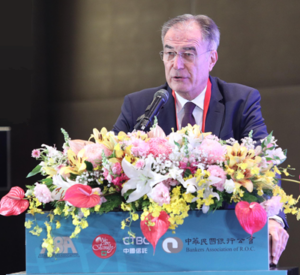 (2) Mr. Friedrich Mostboeck, Head of Group Research at Erste Group, presented on “ESG on Capital Markets: ESG Is based on Megatrends and not Theory.” Mr. Mostboeck explained that ESG is driven by megatrends and should be viewed neutrally and independently, rather than as a theory or political view.
(2) Mr. Friedrich Mostboeck, Head of Group Research at Erste Group, presented on “ESG on Capital Markets: ESG Is based on Megatrends and not Theory.” Mr. Mostboeck explained that ESG is driven by megatrends and should be viewed neutrally and independently, rather than as a theory or political view.
He highlighted the ongoing crises and failures across various sectors, which pose significant risks for investors in capital markets. Mr. Mostboeck explained how ESG is a vital tool for mitigating these risks by addressing environmental, social and governance factors that directly impact market stability and long-term growth. He emphasized that ESG is integral to building stakeholder confidence.
Mr. Mostboeck further explained that ESG serves as a form of risk management, allowing corporate managers and state representatives to be held accountable for their actions.
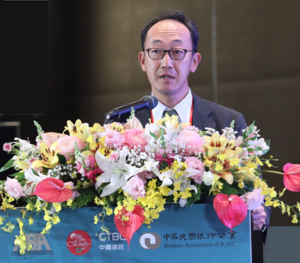 (3) Mr. Tadahiro Kaneko, Senior Assistant to Unit Heads of Global Banking and Wholesale Business at Sumitomo Mitsui Banking Corporation (SMBC), outlined the sustainability initiatives of SMBC Group (Supporting GX with partners), highlighting the following elements:
(3) Mr. Tadahiro Kaneko, Senior Assistant to Unit Heads of Global Banking and Wholesale Business at Sumitomo Mitsui Banking Corporation (SMBC), outlined the sustainability initiatives of SMBC Group (Supporting GX with partners), highlighting the following elements:
- Visualization: Supporting clients in “visualizing” their activities, such as quantifying greenhouse gas emissions, utilizing partner companies’ tools and services.
- Connecting: Facilitating connections between clients and companies who own cutting edge technologies and platforms in the energy transition sector, helping them achieve net-zero goals.
- Risk taking: Promoting transition finance.
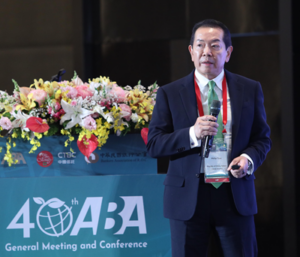 (4) Mr. Philip Tsao, Chairman of Bank SinoPac, spoke on “Partnering in Achieving Sustainability Goals.” His presentation addressed several key issues, including:
(4) Mr. Philip Tsao, Chairman of Bank SinoPac, spoke on “Partnering in Achieving Sustainability Goals.” His presentation addressed several key issues, including:
- The role of financial institutions in promoting sustainability
- Current and future sustainability standards, disclosure, and evaluation
- Vertical and horizontal financial partnerships
- Bank SinoPac’s approach and strategy in achieving sustainability partnerships
Plenary Session 3: Refocusing on Customers and Society
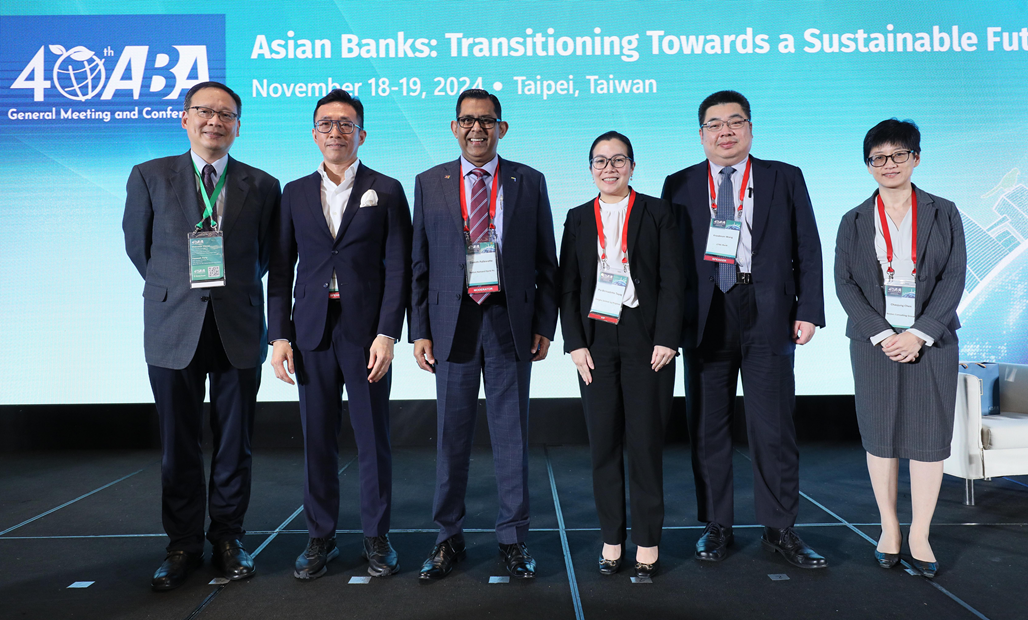
The speakers agreed that the pandemic has compelled banks and financial institutions to adopt new business models and accelerate their digital transformation. A key theme throughout the session was the need for banks to deliver seamless, customer-centric services that align with evolving customer expectations. A survey by Ernest & Young highlighted that customer expectations are rapidly shifting, with consumers increasingly favoring banks that offer integrated and intuitive experiences.
Speakers and panelists shared insights on the importance for banks and other financial institutions to critically assess their current products and services. They emphasized the need identify opportunities for a greater customer-centricity and personalization, aiming to enhance the overall financial services customer experience.
Moderated by Mr. Damith Pallewatte, CEO of Hatton National Bank, the session featured the following speakers and panelists:
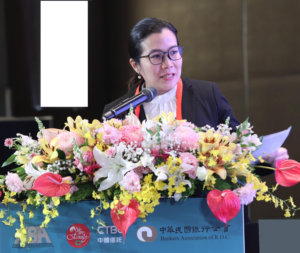 (1) Ms. Pia Bernadette Roman Tayag, Assistant Governor and Chief Sustainability Officer at Bangko Sentral ng Pilipinas, presented on “A Regulator’s Perspective on Customer Centricity in the Banking Sector.” Ms. Tayag observed that customer centricity is not a matter of regulatory compliance but a fundamental business imperative. Her presentation explored considerations for adopting customer-focused practices in the banking sector:
(1) Ms. Pia Bernadette Roman Tayag, Assistant Governor and Chief Sustainability Officer at Bangko Sentral ng Pilipinas, presented on “A Regulator’s Perspective on Customer Centricity in the Banking Sector.” Ms. Tayag observed that customer centricity is not a matter of regulatory compliance but a fundamental business imperative. Her presentation explored considerations for adopting customer-focused practices in the banking sector:
The Imperative for Customer Centricity: The need to deliver exceptional value in a competitive and rapidly changing environment.
- Integrating Sustainability Considerations: The necessity of embedding sustainability into both brand identity and operational strategies to remain relevant in today’s evolving market.
- The Business Case for Sustainability: Beyond compliance and risk management, sustainability offers significant business growth opportunities, creating value for both financial institutions and their customers.
Ms. Tayag also shared how banks can translate consumer protection mandates into effective representation of the consumer’s voice in banking practices.
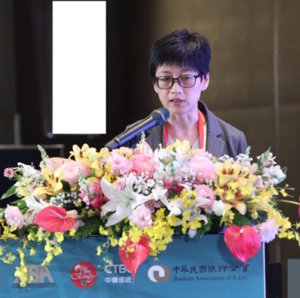 (2) Ms. Chaojung Chen, Managing Director and Senior Partner at Boston Consulting Group, addressed the topic “Redefining New Generation of Primary Banking Relationships (PBR).” Ms. Chen discussed how digitalization and generative AI are reshaping banking relationships with customers.
(2) Ms. Chaojung Chen, Managing Director and Senior Partner at Boston Consulting Group, addressed the topic “Redefining New Generation of Primary Banking Relationships (PBR).” Ms. Chen discussed how digitalization and generative AI are reshaping banking relationships with customers.
She outlined key challenges that retail banks will face by 2030, including:
- Digital will be the predominant sales channel by 2030, with over 70% simple product sales (e.g. current account, credit card, installment loan) and 45%-60% of complex product sales (e.g. mortgage, investment advice)
- Digital challenger banks are replacing traditional retail banks.
- Building strong, sales-driven digital and remote channels will facilitate the closure or transformation of over two-thirds of existing branches by 2030, while capturing increased market share.
- Banks that fail to innovate will face a 65% higher cost-income-ratio (CIR) by 2030, compared to transformed banks; CIR will increase to approximately 74% by 2030 if banks continue to operate as they are, up from 63% in 2022, while the successful banks will be positioned to achieve a 40-50% or lower CIR.
Ms. Chen also highlighted how several banks have made significant strides in improving their mobile banking capabilities. Leading banks accomplish this by:
- Setting a bold, top-down ambition to dramatically improve mobile capabilities, ensuring this is a top priority with dedicated resourcing and funding, rather than incremental change (business-as-usual/BAU mode).
- Adopting a “mobile-first” mindset. Most actions, initiatives, and investments need to be prioritized with the goal of advancing mobile banking capabilities, potentially with major reprioritization of the bank’s “change/IT/delivery portfolio”.
- Organizing in multi-disciplinary pods that cut across traditional organizational silos. BCG has seen banks struggle to drive a good customer experience because of disconnects between product, digital, fraud, and operations teams.
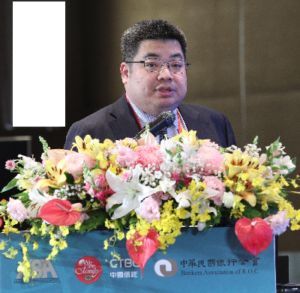 (3) Mr. Friedman Wang, Executive Vice President of the Technology Group, Digital Technology Division at CTBC Bank, addressed the topic “AI Application Island: Crafting the Future of AI Business Applications.” Mr. Wang highlighted Taiwan’s strategic position in the global wave of rapid AI development, noting that while the country currently focuses primarily on the manufacturing sector, future efforts should pivot towards AI applications. He emphasized the importance of leveraging lessons learned from the previous generation of network technology development to guide this shift. Key points from his presentation included:
(3) Mr. Friedman Wang, Executive Vice President of the Technology Group, Digital Technology Division at CTBC Bank, addressed the topic “AI Application Island: Crafting the Future of AI Business Applications.” Mr. Wang highlighted Taiwan’s strategic position in the global wave of rapid AI development, noting that while the country currently focuses primarily on the manufacturing sector, future efforts should pivot towards AI applications. He emphasized the importance of leveraging lessons learned from the previous generation of network technology development to guide this shift. Key points from his presentation included:
- Digital Next: AI will continue to evolve, building upon existing digital development.
- Future financial business models will transform with AI agents addressing longstanding problems.
- The importance of achieving responsible AI innovation through robust AI governance, balancing innovation value and risks, and ensuring the safe and effective implementation of AI.
 (4) Mr. Frankie Wai, Business Solution Director for Asia Pacific at Temenos, presented on the topic “Shaping Banking with Customer-Centric Innovation.” He outlined several structural trends in banking, including increasing cost headwinds, the rise of hyperscalers, generative AI (Gen AI), and modular architecture, the surge in digital interactions; the growing threat from nonincumbents players, and heightened regulatory and compliance complexity. He stressed that these trends demand proactive actions from bank tech providers.
(4) Mr. Frankie Wai, Business Solution Director for Asia Pacific at Temenos, presented on the topic “Shaping Banking with Customer-Centric Innovation.” He outlined several structural trends in banking, including increasing cost headwinds, the rise of hyperscalers, generative AI (Gen AI), and modular architecture, the surge in digital interactions; the growing threat from nonincumbents players, and heightened regulatory and compliance complexity. He stressed that these trends demand proactive actions from bank tech providers.
Mr. Wai also highlighted the dual edge nature of Gen AI. On the positive side, he noted the following opportunities:
- Gen AI estimated to add US$2.6 trillion to US$4.4 trillion annually to the global economy
- Increase the impact of all AI by 15% to 40%.
- Estimated to add US$200 billion to US$340 billion annually into the global banking industry.
- Augment individual capabilities through personalized automation of tasks.
- However, he also cautioned about the risks associated with Gen AI, including:
- Potential loss of privacy and may be retained and used.
- Risk of content infringement on third-party intellectual property rights and privacy laws.
- Information generated may be incomplete, biased, or entirely false.
- Customers may not benefit from copyright protection for AI-generated content.
- Current Gen AI vendors do not offer on-premise solutions.
Host Bank Session: U.S. Seeking Soft Landing, and China Seeking Economic Turnaround
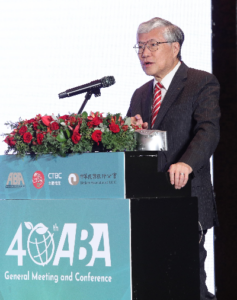 Chaired by ABA Chairman Mr. Daniel Wu, the Host Bank Session addressed the topic “U.S. Seeking Soft Landing, and China Seeking Economic Turnaround,” with Mr. Richard C. Koo, Chief Economist at Nomura Research Institute, delivering the keynote. Mr. Koo, who coined the term “balance sheet recession” applied this concept to explain the economic challenges currently faced by the U.S., Japan and China.
Chaired by ABA Chairman Mr. Daniel Wu, the Host Bank Session addressed the topic “U.S. Seeking Soft Landing, and China Seeking Economic Turnaround,” with Mr. Richard C. Koo, Chief Economist at Nomura Research Institute, delivering the keynote. Mr. Koo, who coined the term “balance sheet recession” applied this concept to explain the economic challenges currently faced by the U.S., Japan and China.
He noted that both the U.S. and Japan are struggling to normalize monetary policy due to the excess liquidity created by previous rounds of quantitative easing. In contrast, China is entering a long and painful process of balance sheet repair following the collapse of its housing bubble. To provide context for China’s challenges, he compared the situation to Japan’s experience in the post-1990s and economic conditions in Western economies after the 2008 financial crisis.
Mr. Koo also shared his perspective on the potential impact of a further interest rate cut by the U.S. Federal Reserve on both advanced and emerging economies. He outlined proactive steps that policymakers should take to manage risks associated with capital miscalculations and asset bubbles, given the complex challenges faced by advanced economies, such as high debt levels and potential systemic risks.
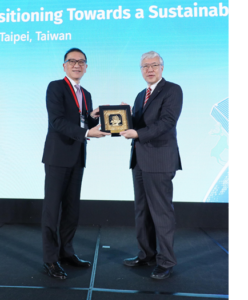 He also discussed how these policies might impact emerging markets particularly in terms of capital flows. In addition, Mr. Koo commented on the implications of Donald Trump’s victory for Asia, explaining the following points:
He also discussed how these policies might impact emerging markets particularly in terms of capital flows. In addition, Mr. Koo commented on the implications of Donald Trump’s victory for Asia, explaining the following points:
- Trump won because the establishment lost the trust of half of the population.
- A significant portion of that group suffered from trade deficits caused by 37 years of dollar over-valuation.
- While sectors like finance, academia, media, and other service industries were unaffected by a strong dollar, manufacturing and agriculture were hurt.
- The traditional Republican support for free trade, combined with the Democratic Party’s indifference toward a strong dollar — exemplified by Biden’s comment, “our currency, their problem” — pushed victims of trade deficits toward Trump.
Plenary Session Four: CEO Forum: Great Banking Transition
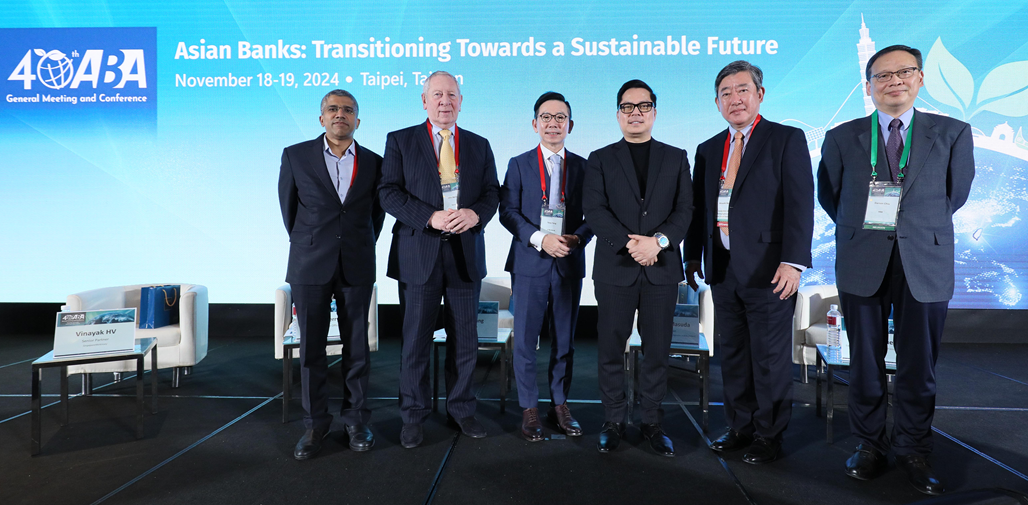
The panelists discussed how the current challenging macroeconomic environment, along with a multitude of change drivers, is fueling the need for a strategic reset. They emphasized that financial institutions in Asia-Pacific must become more agile, responsive, and resilient to remain competitive in an increasingly complex ecosystem. The panelists also agreed that banking has faced a difficult path in recent years, grappling with increased oversight, digital innovation, and new competition.
They highlighted the need for financial institutions to adjust and adapt to the evolving landscape of the Great Banking Transition, particularly in the areas of technology, regulation, risk and scale. The panelists outlined key priorities, urging financial institutions to re-examine their business models while ensuring they are positioned to generate adequate returns.
(3) 40th ABA General Meeting Proper

ABA Chairman Mr. Daniel Wu presented the Chairman’s Report, summarizing the activities undertaken by ABA since the last Conference in November 2023 held in Kathmandu, Nepal.
Mr. Wu highlighted that, despite challenges such as geographic distance, limited resources, and ongoing economic and geopolitical developments affecting global markets, the ABA continued its efforts to create value for member and the broader Asian banking sector. He expressed gratitude to the members who contributed to these initiatives, emphasizing that their support was crucial to ABA’s achievements over the past year.
Key projects included preparations for the 40th ABA General Meeting and Conference, policy advocacy, webinars and training programs, membership recruitment, strengthening relationships with other regional banking associations and multilateral organizations, as well as information exchange and publications.
(4) B2B Networking Sessions
 The two-day Conference featured two B2B networking sessions designed to foster “bank-to-bank” knowledge sharing among industry peers. These sessions provided a platform for participants to exchange insights, explore case studies, and learn from one another’s experiences. The goal was to equip attendees with valuable strategies for navigating the dynamic financial landscape.
The two-day Conference featured two B2B networking sessions designed to foster “bank-to-bank” knowledge sharing among industry peers. These sessions provided a platform for participants to exchange insights, explore case studies, and learn from one another’s experiences. The goal was to equip attendees with valuable strategies for navigating the dynamic financial landscape.
The Day One B2B Networking Session focused on “Current Landscape and Future Trends in Asian Financing Market.” Speakers included Mr. Matthew Liaw, EVP and Head of Structured Finance Division at CTBC Bank, and Mr. Aaron Chow, Managing Director and General Manager of the Loan Capital Markets Department at SMBC.
The Day Two B2B Networking Session addressed “Cross-Border Business Strategies of Asian Banks.” The speakers were Ms. Christine Lin, SVP and General Manager of the International Banking Department at Taiwan Cooperative Bank, and Mr. Sam Cheong, Foreign Direct Investment Advisory at UOB Group International Management.
(5) Meeting of the ABA Policy Advocacy Committee
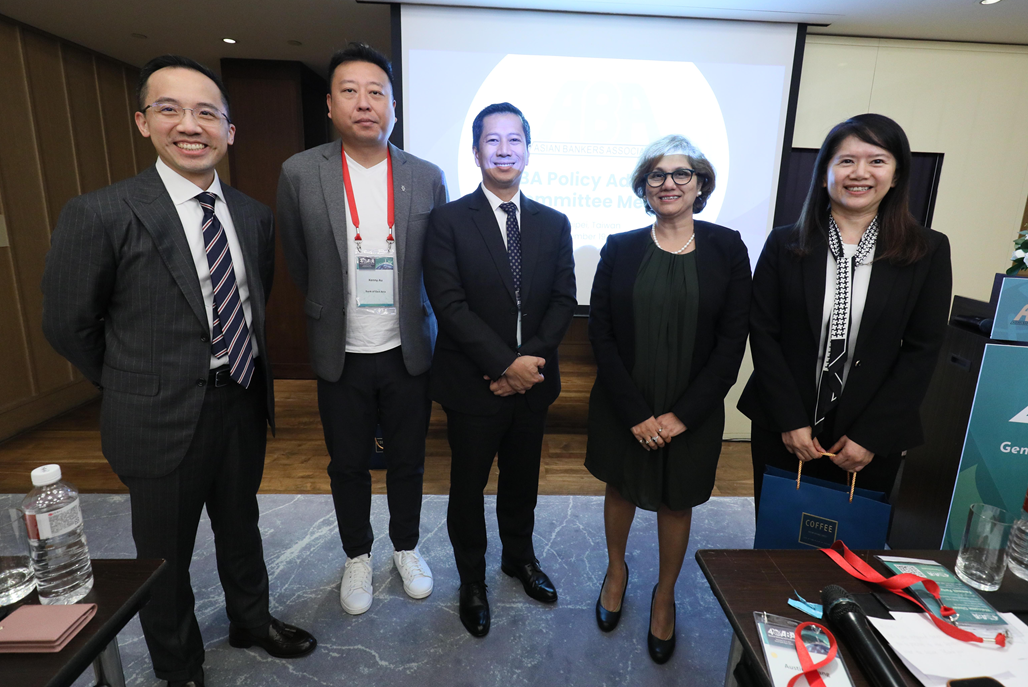
The ABA Policy Advocacy Committee convened to discuss several key policy papers addressing critical issues impacting the banking sector. The following papers were presented:
(1) “Promoting Modernization of Banking Technology for a Future-Ready Operating Platform and Enhance Cybersecurity”— prepared by Mr. John Alabastro, Head of the IT Shared Services Group at Rizal Commercial Banking Corporation (RCBC), Philippines.
(2) “Promoting and Sharing of Information on AI Use Cases and AI Technology Implementation in Banking”— prepared by Mr. Kenny Au, Head of Operations Division at the Bank of East Asia Ltd.
(3) “Exploring Concept and Roadmap of Net Zero Banking Under COP 28 Conclusion and Institutional Investor Expectation on Science-Based Target (SBT) Commitment for Banks” — prepared by Ms. Sophie You, Senior Vice President at CTBC Bank.
(4) “Climate Transition: A Roadmap for Banks in Emerging Markets” — presented by Ms. Namita Vikas, Founder and Managing Director at auctusESG.
(6) Welcome Dinner
Welcome Remarks by ABA Chairman
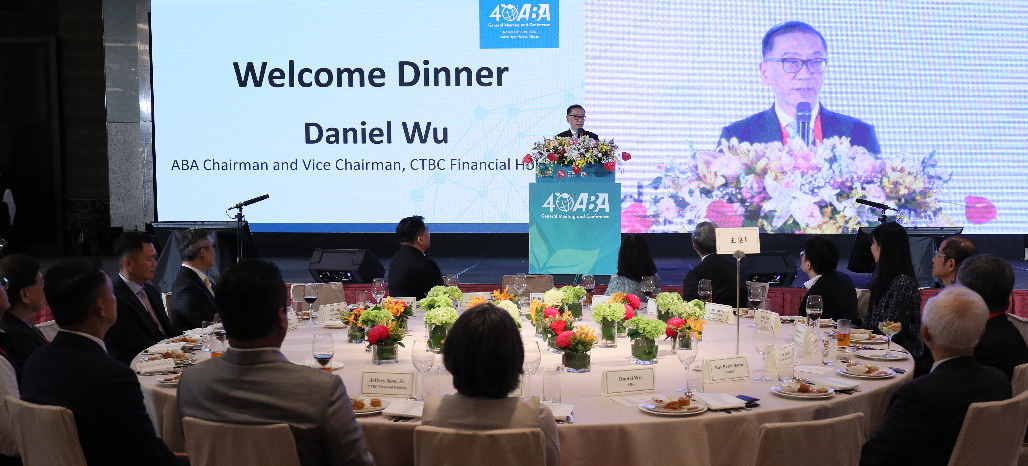
In his address to delegates at the Welcome Dinner, ABA Chairman Mr. Daniel Wu expressed his hope that the evening would not only set the stage for upcoming discussions, but also strengthen relationships and camaraderie among the attendees. Noting that the ABA was established primarily to provide a platform for Asian bankers to build direct business relationships and accelerate economic development in the region, Mr. Wu encouraged members to take advantage of the two-day conference to network and explore possible business partnerships.
Special Adress by Vice President of the Republic of China
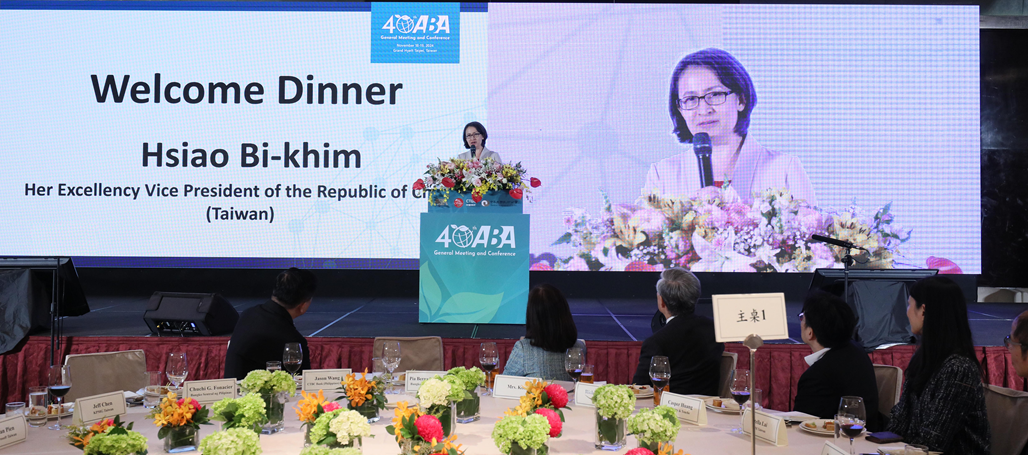
The Welcome Dinner on November 18 was graced by the presence of H. E. Bi-khim Hsiao, Vice President of the Republic of China (Taiwan), who delivered brief remarks. In her address, Vice President Hsiao said that the ABA gathering was being held at a time when the global financial landscape is rapidly evolving. She noted that discussions during the Conference would help guide collective efforts to promote resilient economies and shared prosperity across Asia, addressing challenges from technological innovations to sustainability.
Vice President Hsiao also emphasized Taiwan’s role as a key player in the regional economy. She reaffirmed the government’s commitment to supporting these goals, with a focus on fostering a stable and dynamic financial environment that embraces technological advancements while ensuring sustainable growth for all.
In closing, she expressed sincere gratitude to the ABA leadership for its continued dedication, and to all ABA members for their participation in the Conference. She encouraged delegates to not only engage in fruitful discussions but also experience Taiwan’s warm hospitality and vibrant culture during their stay.
Special Remarks by Executive Director of CTBC Financial Holding
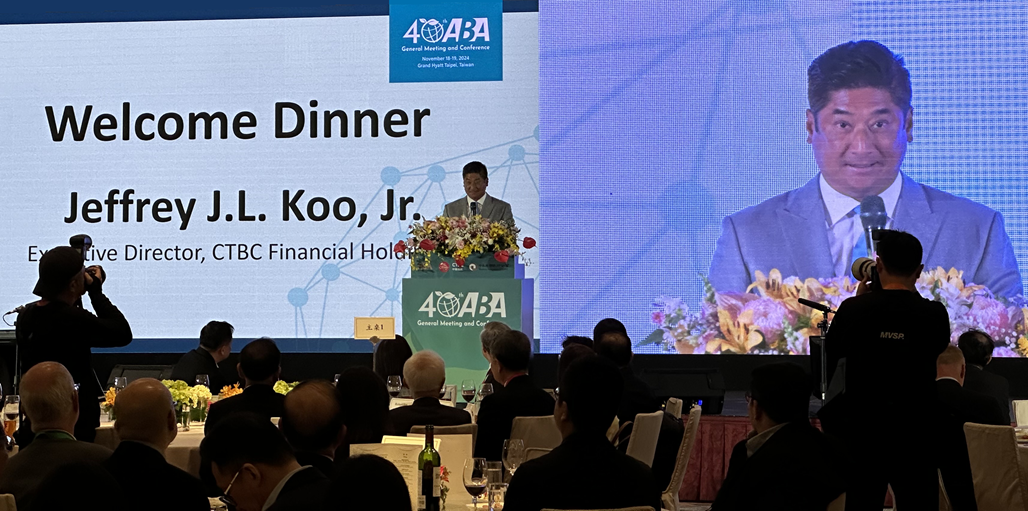
Mr. Jeffrey Koo Jr., Executive Director of CTBC Financial Holding, also addressed the gathering. Reflecting on ABA’s founding in 1981 by his late father, Dr. Jeffrey L.S. Koo, along with three visionary friends and colleagues, he shared that their goal was to create a platform where bankers across Asia could unite, collaborate, and innovate. Four decades later, he noted, ABA has become a leading organization in the banking industry, symbolizing leadership, cooperation, and shared progress.
Mr. Koo expressed pride in CTBC Bank’s position as the number one private bank in Taiwan, both in financial performance and its commitment to corporate social responsibility and ESG. He highlighted the bank’s longstanding support for baseball, a sport deeply rooted in Taiwanese culture, with around 20 million viewers across Taiwan, many of whom are fans of the CTBC Brothers baseball team. CTBC has supported the sport at all levels, from youth programs like U-12 leagues to professional teams. Mr. Koo emphasized that in Taiwan, baseball is more than just a sport — it is a cultural force, driven by unique traditions and a passionate fanbase. He expressed that CTBC is proud to contribute to the sport’s growth and success.
In closing, Mr. Koo expressed gratitude to ABA members and participants for their continued commitment to the organization and leadership in the banking industry. He called on them to honor the legacy of those who came before by working together to build a stronger, more resilient, and inclusive financial community for the future.
(7) Farewell Party
 During the gala dinner, ABA Chairman Mr. Daniel Wu expressed his gratitude to the Conference speakers, panelists and session chairs for their valuable contribution in broadening delegates’ understanding of the challenges and opportunities facing the banking industry. He also reflected on the significance of the gathering, noting that it had provided delegates an opportunity to reconnect with colleagues from other countries and forge new relationships with both longstanding and new member banks.
During the gala dinner, ABA Chairman Mr. Daniel Wu expressed his gratitude to the Conference speakers, panelists and session chairs for their valuable contribution in broadening delegates’ understanding of the challenges and opportunities facing the banking industry. He also reflected on the significance of the gathering, noting that it had provided delegates an opportunity to reconnect with colleagues from other countries and forge new relationships with both longstanding and new member banks.
Mr. Wu concluded by expressing his hope of delegates leaving at the end of the evening with a deeper understanding of one another and a stronger foundation on which to build relationships
Special Address by Deputy Minister of Foreign Affairs
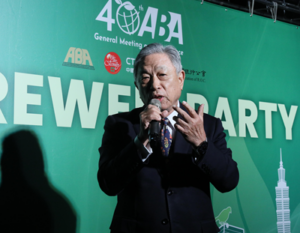 Deputy Minister of Foreign Affairs of the Republic of China (Taiwan), Tien Chung-kwan, highlighted that the ABA Conference addressed vital topics driving the region’s business sector toward sustainable growth and prosperity. He emphasized that these discussions are crucial for achieving a shared future.
Deputy Minister of Foreign Affairs of the Republic of China (Taiwan), Tien Chung-kwan, highlighted that the ABA Conference addressed vital topics driving the region’s business sector toward sustainable growth and prosperity. He emphasized that these discussions are crucial for achieving a shared future.
He noted Taiwan’s commitment to advancing sustainable practices, particularly in the finance sector, and stressed the importance on blending innovation with sustainability. This approach ensures that technological advancements support environmental, social, and economic goals, in line with ABA’s objectives. Taiwan’s commitment, he added, spans from regulatory reforms, promoting green financing, advancing digital transformation, to cultivating international relationships to foster stability and growth.
As Deputy Minister of Foreign Affairs, he expressed pride in Taiwan’s leadership in digitalization, financial innovation, and sustainable finance, underscoring these advancements as part of the government’s dedication to both national progress global cooperation.
(8) 63rd ABA Board of Directors’ Meeting
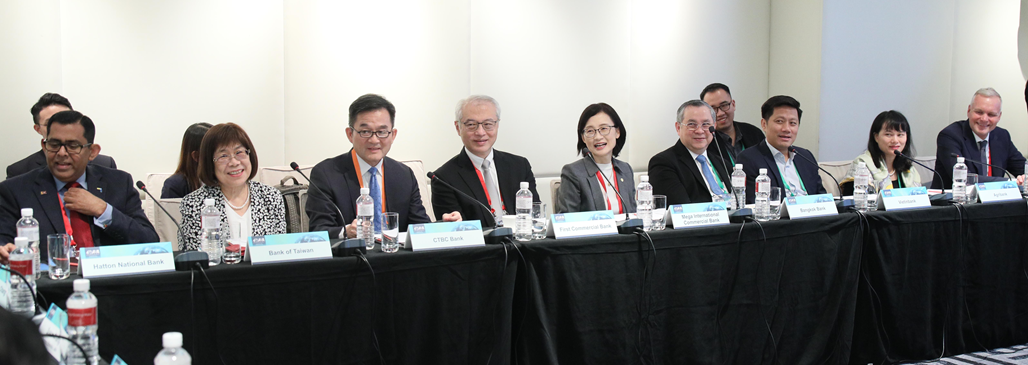
During its Taipei gathering, the ABA also convened the 63rd ABA Board of Directors’ meetings, during which the Board discussed internal policy issues and took action on a number of important matters. Among other decisions, the Board:
(a) Endorsed the following recommendations of the ABA Advisory Council, which were made during a meeting held the previous day:
- The appointment of an additional Vice Chairman to assist the Chairman in leading the Association toward achieving its objectives of promoting the interest of members;
- Allowing bankers associations –currently classified as Special Members – to be reclassified as Regular Members, should they express interest in writing;
- Undertaking income-generating activities for ABA, which could include, but not limited to, the following:
- Sharing of the registration fees and sponsorship receipts collected by the host organization for the annual ABA General Meeting and Conference;
- Sharing of participation fees collected by Knowledge Partners for training programs organized for ABA members;
- Collecting fees from companies or organizations wishing to advertise in the monthly ABA Newsletter and the semi-annual ABA Journal.
- The holding of the ABA Conference in 2025 in Bhutan, with the Bank of Bhutan serving as the host.
(b) Reviewed and approved the audited financial report for the period from January 1 to December 31, 2023, as well as the un-audited Statement of Receipts and Disbursements for the period from January 1 to September 30. Both reports continued to show a healthy fund balance of the Association.
(c) Formally admitted the following new members:
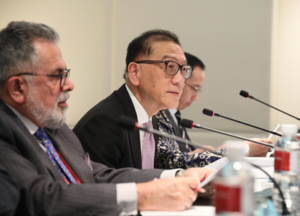 Regular Members:
Regular Members:
- Azer-Turk Bank (Azerbaijan)
- Karafarin Bank (Iran)
Special Member:
- Vietnam Banks Association
Associate Members:
- BioCatch Ltd.,
- Maldives Finance and Leasing Company Ltd.
- LexisNexis Risk Solutions
- Vietnam Finance Company Ltd.
(d) Approved the proposed ABA budget for 2025
(e) Formally accepted the offer from the Bank of Bhutan to host the 41st ABA General Meeting and Conference in 2025.
(f) Constituted the 2025 Planning Committee and tasked it with overseeing preparations for the 41st ABA General Meeting and Conference.
(g) Passed a resolution of thanks to CTBC Bank and the Bankers Association of the Republic of China (BAROC) for graciously hosting the 40th ABA General Meeting and Conference.
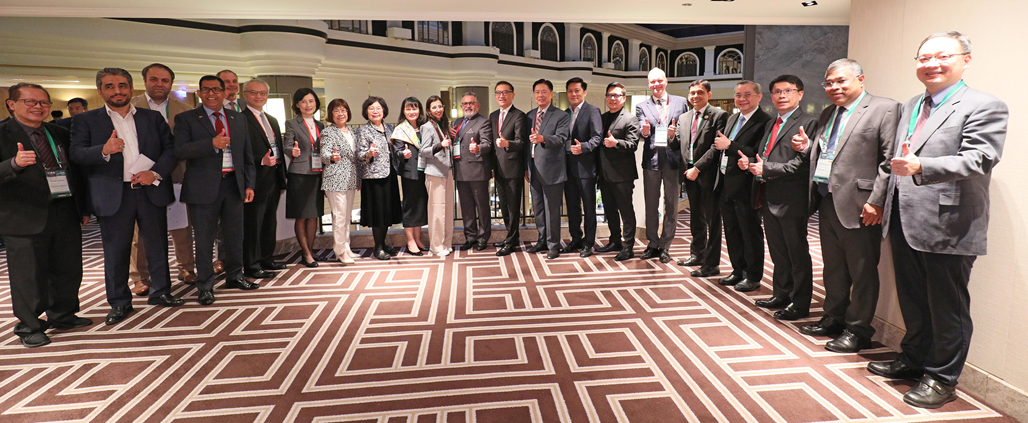
Press Conference
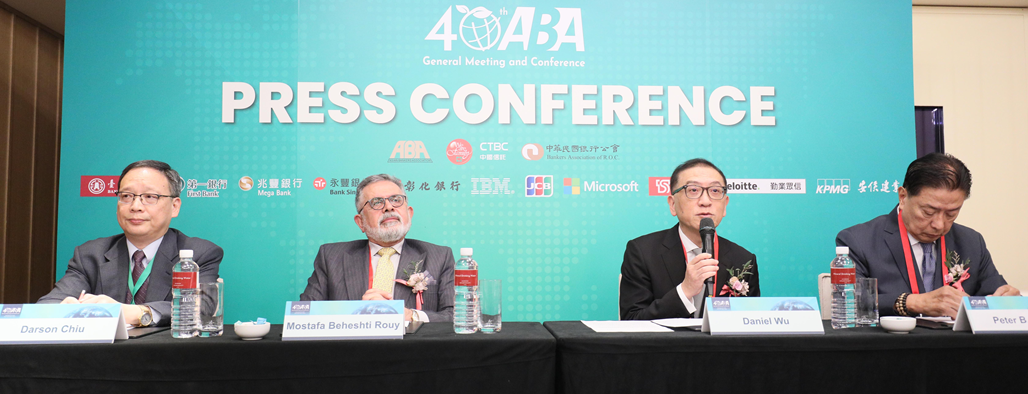
ABA Chairman Mr. Daniel Wu informed the media that ABA was founded in October 1981 to provide a forum for advancing the banking industry and promoting regional economic cooperation. Since its founding, ABA members have gathered annually for meetings and seminars across the region. These events have been key in facilitating the exchanges of ideas and addressing important issues facing the banking industry. Over the past 43 years, ABA has played a central role in fostering collaboration and sharing insights among bankers in Asia.
During the Press Conference, several key questions were addressed, including: (a) the potential impact of the U.S. Federal Reserve’s anticipated rate cuts on the Asian banking sector, (b) ABA’s role in helping member banks navigate global economic uncertainties and geopolitical instability, (c) how the Fed’s monetary easing influences cross-border investments and trade in Asia, (d) how Asian banks are preparing for a potentially prolonged period of lower global interest rates, and (e) the main focus of the ABA 2024 Conference and its relevance in the current climate.

